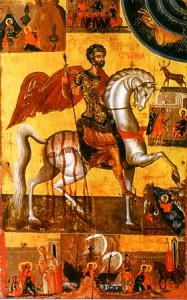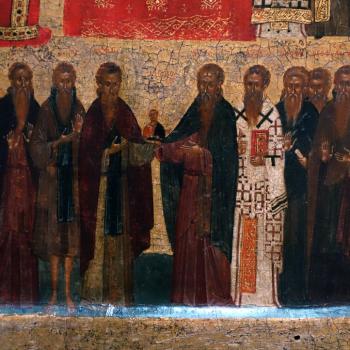
The legend surrounding St. Eustathius tell us how he went from being a Roman general (originally named Placidus) to becoming a Christian convert and eventual martyr for the faith. While he was on a hunt, he saw a great stag; between the antlers of the stag, he saw the cross, and through the cross, Jesus is said to have spoken to him, telling him to become Christian. While he was away his wife, Tatiana, also received a vision of Christ, telling her to become Christian. When they told each other what happened, they sought after a bishop, who baptized them and their whole family (Tatiana took on the name of Theopista at her baptism, while Placidus took on the name Eustathius).
After their conversion, it seems, they suffered a great number of tribulations; their family home suffered from the effects of the plague, killing many of their servants, as well as their livestock. They took off to Egypt, only to have series of unfortunate events separate the family, with Theopista being abducted by the shipowner who had taken them abroad (to Egypt). Not able to rescue her from her abductor, Eustathius was concerned about the welfare of his sons. They continued their journey as he hoped he would find a way to protect them; when they reached a river, a lion and a wolf was said to have abducted both of his sons, leaving Eustathius alone. With great sorrow, and not knowing what to do, he entered into humble service in the village of Badessos. He worked there for five years, not knowing that his sons had been saved by shepherds and had been living nearby, and his wife’s captor had died soon after her abduction, and she was able to stay where she was in relative peace.
Eventually, Eustathius’s men came looking for him. When they found him, he resumed his position as a general, helping to quash a rebellion. This happened during the reign of Trajan. Once again a general, Eustathius recruited many new men, among which, were his two sons; because of how much they aged, none of them recognized each other, but one day, the two brothers were talking about their life experiences, and when the elder told how he had been abducted by a lion, the younger brother recognized his older brother and revealed to him who he was and that he had been similarly taken by a wolf. One day, talking about this, they were inside a tent which was outside a house where their mother lived. She heard them talking and realized who they were; she wanted to be with them, and so went to the commander, their father, and told him how she had been held prisoner and now wanted to go home with her sons. When she saw who the commander was, she rejoiced, and told him who she was and that their sons were alive and serving under him. In this way, the family had been reunited.
That joy would be short-lived. Eustathius’ success had him called to Rome, to be honored for his accomplishments. He had stopped a rebellion, though Trajan had died. Hadrian, Trajan’s successor, wanted to recognize the deeds of the general. But, when they got there, Hadrian also wanted Eustathius to sacrifice to the gods as thanks for their protection. When Eustathius said he would not do so, because he was a Christian, Hadrian was enraged. He had the whole family brought together. He gave them a chance to renounce their faith and be rewarded, but when they declined, he tried to have them torn apart by wild animals. The animals, instead of attacking the family, left them in peace. Still angered, Hadrian put them all in large brass bull, which then was heated up until the family was killed. When the bull was cool enough to open up, despite what they had experienced, the family’s bodies were said to be pristine, and their faces shined with unearthly glory, converting many to the Christian faith.
While the story of St. Eustathius is riddled with legend, the legend seems to be telling a story beyond historical fact and yet loosely based upon it. The story was told in order to relate spiritual truths, transcendent truths, like many of Jesus’ parables. Nonetheless, the lively nature of the story, combined with what can be learned from it, made it a popular legend in medieval times. A general, a hunter, found himself, in the end, to be hunted and killed by the same people he had otherwise served. He had earned great glory for what he had achieved, but that glory only led to his demise. Human glory, human fame, wealth, all of it, is shown to be transitory in nature; those who receive such glory can be quickly hated by those who would give it, if those who give it do not receive what they want in return. Indeed, what can be pleasing one day, can lead to great hardships the next; how we handle those hardships will define us. Eustathius and his family bore their suffering well. They were prepared to pay the ultimate price, their lives, in order to remain true to their faith. They did not look for martyrdom, but they were willing to face it if need be. The words Paul spoke, concerning his charism, can also be said to be true to them:
We put no obstacle in any one’s way, so that no fault may be found with our ministry, but as servants of God we commend ourselves in every way: through great endurance, in afflictions, hardships, calamities, beatings, imprisonments, tumults, labors, watching, hunger; by purity, knowledge, forbearance, kindness, the Holy Spirit, genuine love, truthful speech, and the power of God; with the weapons of righteousness for the right hand and for the left; in honor and dishonor, in ill repute and good repute (2 Cor. 6:3-8 RSV).
Honor, dishonor, calamities, beatings, imprisonments, great afflictions, all are seen in the legend of Eustathius. The legend, like many such legends, was based upon a true person, and probably based upon the experiences of his life, even if it exaggerated and added to them. Worldly honor served as the foundation for his afflictions. Such honor came with expectations, expectations which Eustathius and his family were not willing to meet. Those who would give such honors, can quickly show how little they care for those they honor, when those they desire to honor do not bend to their will. They might not hold the power of life and death over others, but they can and will do much to destroy the lives of those who do not bow down to them. This is the way it always has been, and this is the way it will always be until the end of time.
Stay in touch! Like A Little Bit of Nothing on Facebook.
If you liked what you read, please consider sharing it with your friends and family!










